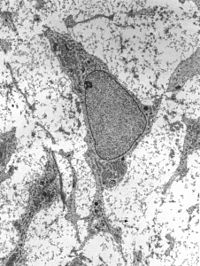
Photo from wikipedia
In Japan, there are approximately 1.5 million patients with schizophrenia, 3 million patients with mood disorders such as depression and bipolar disorder, and 840,000 patients with developmental conditions such as… Click to show full abstract
In Japan, there are approximately 1.5 million patients with schizophrenia, 3 million patients with mood disorders such as depression and bipolar disorder, and 840,000 patients with developmental conditions such as autism spectrum disorders. Given that, according to the disability-adjusted life-years (the sum of years of life lost due to premature mortality and the years of productive life lost due to disability) as of 2019, mental disorders ranked second among diseases in the world as well as in Japan, mental disorders cause significant socioeconomic damage, making the solution of these disorders an urgent issue. Mental disorders are mainly treated with antipsychotic drugs, but the major antipsychotic drugs are effective only in approximately 50% of patients, arguing the need for new drug discovery. To date, molecular and cellular pathogenetic studies have been intensively conducted using molecular genetics, neuropsychology, neuroimaging, neurophysiology, postmortem brains, and animal models and found that developmental abnormalities of the nervous system, functional abnormalities of neurons, and impaired neuronal circuit function are associated with diseases. However, a clear and definite molecular and cellular pathogenesis of mental disorders has not been identified. Induced pluripotent stem cell (iPS cell) technology enables generation of patients’ live neurons harboring the patient’s genetic information. Importantly, given that the precise function of patients’ live neurons can be analyzed with iPS cell–derived neurons in vitro, which was very difficult or almost impossible before iPS cell technology was developed, iPS cell technology provides new insight into molecular and cellular pathogenesis of mental disorders. Arioka et al. comprehensively discuss the trends, importance, limitation, and future perspective of iPS cell technology in the field of mental disorders. iPS cell–derived neurons from patients with Rett syndrome and schizophrenia were first shown to have impaired neural function in 2010 and 2011, respectively. Since then, many studies have been conducted to elucidate the molecular and cellular pathogenesis of mental disorders. In these researches, patient clinical information, including genetic, brain imaging, neurophysiological, and cognitive function data, is important for the interpretation of the experimental results obtained with iPS cell–derived neurons from patients. In particular, taking into account the results of the authors themselves, Arioka et al. describe the importance of the analysis of patient-derived neurons with genomic copy number variations such as 22q11.2 del. Arioka et al. also point out that three-dimensional (3D) brain organoids are emerging as a powerful tool for elucidating the molecular and cellular pathogenesis of mental disorders. Recently, “next-generation” multiregional 3D brain organoids have been developed to model the impaired neural function of the brains of patients with mental disorders. In addition to these, embryonic stem cell– or iPS cell–derived brain organoids transplanted into mouse brains are also effective for mental disorders research. Research into the molecular and cellular pathogenesis of mental disorders using iPS cell technology does not yet have a long history, and further technological development is needed for better modeling mental disorders in a dish. Despite the current limitations of iPS cell technology, it is powerful not only to elucidate the molecular and cellular pathogenesis of mental disorders but also to establish model systems for therapeutic drug development, which ultimately leads to personalized medicine in mental disorders.
Journal Title: Psychiatry and Clinical Neurosciences
Year Published: 2023
Link to full text (if available)
Share on Social Media: Sign Up to like & get
recommendations!